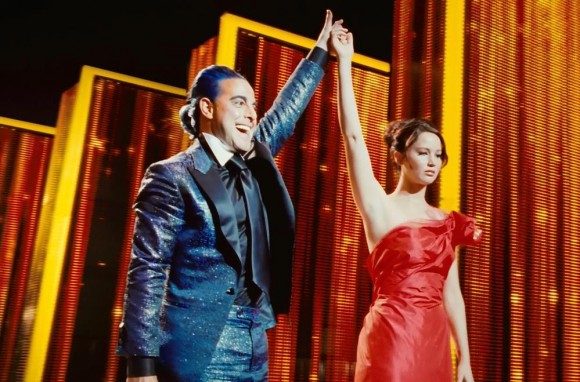Welcome to Revisionist History, where we, unencumbered by the demands of studios and profit margins, try to imagine different and better versions of the movies that are out there. This is not a review; it is a full-spoiler discussion of what works and what doesn’t, particularly from a story/concept standpoint (i.e. unless there’s a particular tic that is distracting, it’s hard to account for a poor acting performance or other failure in execution alone other than to say, “Do better.” Which isn’t very interesting or helpful to anyone.)
Today, we’re revising The Hunger Games.
The Hunger Games has an absolutely fascinating premise. It provides extremely blunt critique of class disparity, the exploitation of disenfranchised people, and the willingness of masses to be fooled by propaganda for the sake of entertainment. The series has attracted a wide fan base both for its story and for its protagonist, Katniss Everdeen. Given all that The Hunger Games represents, I do wish that I liked it a lot more than I do. Unfortunately, I just see plot holes and wasted potential. There is so much more this series could do to both strengthen its plot and give the social commentary even more bite. To keep things simple, this revision will focus almost exclusively on The Hunger Games part one. Catching Fire’s first act was a significant improvement over the first movie since it made the connection between the games and the public’s reaction to them more explicit; nevertheless, the events of the plot which concerned the 75th Games could also be improved with changes similar to those I shall outline below. Also worth noting: I’m coming out this without having read the books, which I understand are narrated in the first person. The movie doesn’t share that characteristic, so I’m not going to feel beholden unto it.
While The Hunger Games does an excellent job of telling the audience how much the preparation of the games matter to the public, with all of the pomp and circumstance drawing the attention of seemingly every person, it does a poor job elaborating on that relationship once the games start. The third act of the film, devoted to the actual Games, does little to show that connection between the events of the games and the reactions of the general public. We the audience can only see events from Katniss’s perspective rather than have the chance to compare what happens in the games against what the commentators tell the spectators. Time could have been spent showing more of the public’s reaction to the games as they were going on, or developing subplots around the other tributes. We see plenty of commentary and interviews leading up to the games, but during the games the commentary becomes little more than exposition. The movie also introduces the idea of tributes attracting sponsors but does not do much with that idea. Katniss, despite getting the highest ratings which is supposedly an advantage, receives little help during the games and feels like the underdog. All of the supplies seem equally accessible to all tributes and we only see Katniss receive two care packages during the Games. Finally, the Gamemakers appear to have a strong influence on the events of the game, but it is unclear if they are bound by any rules. I wanted the rules and mechanics of sponsors and the Gamemakers’ influence better explained. The unexplored possibilities of both felt like plot holes that, when filled, could help strengthen the social commentary. It is with those goals in mind that I propose this alternate version of The Hunger Games.
The events involving Katniss and her friend Peeta becoming the tributes from District 12 will remain unchanged so they will not be discussed here. To recap a few key points, Katniss volunteered to be District 12’s tribute, the first from her district to do so. Districts 1, 2, and 4 have routinely exploited loopholes in various laws in order to train tributes for the games. These trained tributes are referred to as Careers. As a result, most of the victors come from those districts, increasing their profile and popularity in the Capitol. District 12’s only champion, Heymitch, refuses to participate in the pageantry surrounding the games. As a result, District 12 has the lowest profile and fewest supporters. During the games, tributes can receive gifts from their wealthy sponsors and common fans to help them survive and win.
Most of the events and ideas we will discuss were touched upon by the movie to varying degrees but largely glossed over. Consequently, The Hunger Games felt like it was just running down a checklist of moments to put on screen before it could start the games. Our revised version will go into the buildup of the games in greater detail to help establish clearer arcs for the characters and explore more of the issues surrounding the games.
Our revision diverges from the established movie once Katniss and Peeta arrive at the Capitol. From the minute the tributes meet their mentors, previous winners from their respective districts, they are taught to appeal to the masses. The Career Tributes do not just train for the games, they also train to play to the crowd. They embellish certain aspects of their lives and talents in order to seem more relatable and appealing to the spectators. Since the tributes only have a brief time to attract sponsors, they will rely on techniques and approaches that proved successful in years past. Mentors use their experience and resources to teach their Tributes what to say in interviews, how to dress when on camera, how to act in public, and how to use interactions with other Tributes while in training to their advantage.
We also see alliances form between likely allies and rivalries between likely foes. How much of the interactions between tributes is genuine or just part of the act is left intentionally ambiguous. Also left unclear is the motivation for these alliances. To the general public these are friendships formed by desperate people looking for any solace in their final days. Behind the scenes, alliances are determined through a tangled web of backdoor deals between previous Victors and the companies they affiliate with. Tributes, especially Careers, believe they are fighting to bring fame and recognition to their District; another Victor to join the upper circles of society or at least a memorable death to raise expectations for next year. Tributes that do not play along find themselves without the help of their mentors and their network of support. Seeing the Tributes adopt their chosen personalities and narratives and then comparing how they behave for the cameras against how they act behind the scenes will reinforce the film’s commentary on propaganda and the falseness that pervades modern society. Adding some drama to flesh out the other tributes would also help liven up the film’s monotonous second act.
Victors from previous Games are, usually, instant celebrities around the Capitol. They are set for life and can easily become high rollers through endorsement deals or job opportunities. The constant rags to riches stories of Victors who become successful, influential individuals after the Games creates at least the illusion of social mobility for people from the Districts. More Victors among the rich and powerful draws more attention, and more business, to their home Districts and more incentive from those business partners to ensure repeat victories. As a result, many sponsors have longstanding relationships with one District and will routinely sponsor only that District’s Tributes. It creates a positive feedback loop that helps keep Districts 1, 2, and 4 at the top and leaves District 12, and Katniss, at a severe disadvantage.
After the presentation of the tributes to the people of the Capitol and demonstrations for the high-rolling sponsors, each of the tributes receive a rating, supposedly based on their estimated chances of winning the games. In truth, the ratings don’t usually matter, and are done entirely for the general public’s benefit. Most Tributes only need to agree to adhere to the conditions put forth by their Mentors and their Sponsor-partners. The sponsors tend to be prominent, wealthy business owners or other public figures Depending on business partnerships between sponsors, they may order their Tributes to work together. Alternatively, a Sponsor might appear, to the public, to find a Tribute’s story moving and agree to support that Tribute (so long as the narrative remains appealing to the crowd). The general public can send gifts and supplies to Tributes as well, but the wealthy Sponsors have far more resources and therefore tend to be much more important.
But as far as the uninformed public is concerned, the numerical ratings matter and since no one wants to sponsor District 12, the ratings are Katniss’ and Peeta’s only chance to get support. Katniss seems largely uninterested in playing to the crowd; her sister is safe and that is the most important thing to her. While Katniss does not wish to die, she has no desire to put on any kind of performance for the amusement of spectators or sponsors. Consequently, she is in real danger of having no supplies, no allies, no help of any kind once the Games begin. However, Heymitch sees potential in her. Unlike most tributes from District 12, Katniss has experience surviving alone in the wilderness and some skill with a bow and arrows. What she needs is a way to draw the attention of the crowd and the cameras. Unfortunately, Heymitch has been reclusive and does not have access to the network of designers, behavior coaches, and publicity specialists that other Mentors have. Heymitch uses all of his resources and favors to hire Cinna, a young up-and-coming designer looking for his big break. Thanks to Heymitch’s advice, Cinna’s dresses, and her own stubborn determination, Katniss emerges the highest rated tribute and gets the most fans. We see signs of the masses falling in love with her almost immediately with people buying banners, merchandise, and “authentic” District 12 food and clothing to show their support. This throws a bit of a kink into typically well-oiled machinations of the behind the scenes Sponsor who usually hold the power over the public.
Once the actual Hunger Games start, we see the teams of Tributes, determined by the prearranged alliances, quickly form and pounce on those left out to dry. The narratives that each Tribute put forth in interviews as their motivation to succeed in the Games are kept at the front of our minds thanks to running commentary from the broadcasters. As almost half the tributes are killed before they can even properly arm themselves, we broadcasters on TV playing along with their insensitive remarks along with reactions from their viewers. We also see the benefits of sponsorship more directly as favored tributes will have gifts placed close to their starting podiums (as opposed to in a pile equal distance from all podiums) but positioned in such a way that leaves the recipient exposed and vulnerable. While Katniss has plenty of donations from her adoring public, she has no allies amongst the other tributes and cannot risk retrieving anything. She instead settles for a basic survival kit located near the edge of the starting area and runs off to hide.
During the games, the Gamemakers are constantly tracking all of the tributes and have the ability to change the terrain and conditions of the Games at a moment’s notice. They can introduce animals, thunderstorms, any manner of hazards to suddenly put tributes on their heels and force confrontations. Ostensibly, these controls are all in place to maximize audience excitement and keep the ratings high, but this system presents endless possibilities for cheating. The influence of previous Victors matters a great deal here as they can call in favors or offer bribes to give their Tributes an advantage. Sponsors of winning, or at least memorable Tributes generally see a bump in their sales or popularity as the Victor thanks them for the support. The performance of their chosen Tributes during the Games therefore matters a great deal to them.
Katniss sees herself targeted because, as the favored candidate, the audience wants to see drama involving her. Additionally, she has no friends with influence to encourage the Gamemakers to keep her alive, the high rollers all want the public to love their Tributes. Rather than just see events play out from Katniss’ perspective, we also see the commentators spin these events in just the way the audience wants to hear. They also take the time to remind us that the status of highest rated candidate is far from a guaranteed victory. In particular, we are reminded of one year when the lowest rated tribute with no sponsors stalked the favorite for that year, killed her at the first opportunity, stole all of her stuff, and emerged as the victor.
Consequently, when Katniss meets Rue, the lowest rated tribute that year, we the audience are made more aware that no matter how friendly Rue seems, she wants to survive and win the Games just as much as Katniss. The broadcasters attempt to set Rue up as a ‘villain’ against the still-favored Katniss. According to them, Rue is just biding her time to catch Katniss unaware. The people of the Districts, not to mention the audience, see right through the deception and recognize that Katniss and Rue have become friends and that Katniss is genuinely heartbroken when Rue dies. Such a display of true emotion is rarely shown during a broadcast of the Games and helps further cement Katniss’ support with the masses, which sets in motion the uprisings that will begin in Catching Fire.
After Rue’s death, the Gamemakers change the rules to permit two tributes from the same district to be co-victors. The public reason given for this change is Peeta’s narrative, his claim that he and Katniss are in love. The rule change actually comes at the demands of the most powerful bloc of Sponsors allied with the Career Districts who still have a few Tributes in the Game. Katniss’ popularity at the beginning of the Games, her status as the underdog, her display of grief at Rue’s death, and her resourcefulness in the face of all obstacles have made her the most watched Tribute in the history of the Games. The audience will assuredly hate whoever kills her, even if he is the victor. At the time of the rule change, all the Districts except 12 have lost at least one tribute. The Sponsor bloc hopes that the rule change will make the other Tributes gang up on Katniss and Peeta so that one of the Careers can avenge their deaths. The Gamemakers make every effort to give the love story a tragic ending, but with the help of care packages sent by those touched by Rue’s death and their “love,” Katniss and Peeta emerge victorious.
Unfortunately for the Head Gamemaker, he lacks the authority to declare two Victors, doing so could land him in serious trouble with the Government. When the Gamemaker attempts to spoil the happy ending at the last second by ordering Katniss and Peeta to turn on each other, they threaten to commit suicide simultaneously. Fearing disaster, the Gamemaker is forced to declare the two co-victors of the 74th Hunger Games. The defiance shown by Katniss and Peeta does in fact make them the most popular Victors yet and catches the attention of President Snow, setting up the events of Catching Fire.






